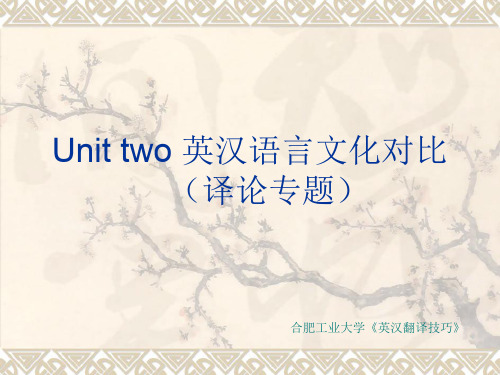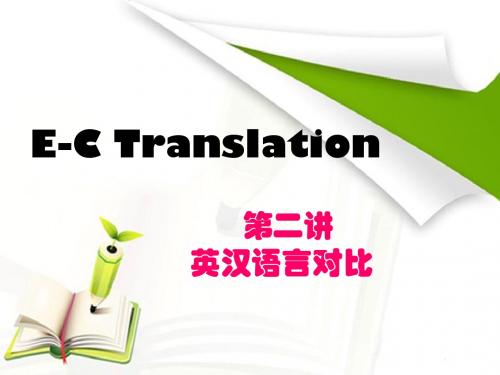第二章 英汉对比(上)
Unit 2 英汉对比和翻译 共18页

Ø 红茶
Ø Take off
3)词的搭配
Ø The new dictionary has really taken off. (popular)
Ø Take off your wet shirt
Ø The doctor took off his wounded left leg. Ø They had to take off (取消) the show because
衣衫褴褛,瘸腿,满脸胡须。
Ø 某些以-ible 或-able结尾的形容词用作定 语时,与every,the only,或形容词最高级 连用来修饰名词时,也常放在名词后
Ø We must help them in every way possible (every possible way). 我们一定要用一切可 能的办法来帮助他们。
of poor audience.
Ø You can take only one day off.
Ø The officer leading the inquiry has been taken
Collocation (continued)
Ø看 Ø 看电视 watch TV Ø 看黑板 look at the blackboard Ø 看电影 see a film Ø 看地图 study a map Ø 看小说 read a novel Ø 看朋友 visit a friend
Ø一个当选希望极微的候选人
5)set phrases:
Ø To make a monkey of
Ø To burn the boat
Ø To fish in the air
Ø To call a spade a spade
第2章英汉对比与翻译

这就要求译者在英译汉时既要准确把握数量众多 的英语短语的意思,还应考虑汉语行文习惯,适 当使用汉语四字结构和排比句式。
译文:It is funny that a beautiful girl like her should fall in love with such an ugly man.
Conclusion:
5. 英语前重心;汉语后重心
英语句子叙事往往是前重心,汉语则习惯 于后重心。
英语句子往往先说最近发生的事,再说先 前发生的事,基本按时间逆序展开;或者 先叙述事实,再说出其发生的时间、地点、 方式手段。汉语正好与此相反。此外,英 语句子往往先给出观点、结论、推断,再 加以论证;而汉语句子则习惯于先说事, 再总结,往往采用“前因后果”句式。
Conclusion:
8. 英语句子主语很少省略;汉语多用无主 语句。
主语在英语句子中的地位是不可动摇的, 除了祈使句、人物对话、说明书或某些特 殊实用文体中有时可省略主语,一般不使 用无主语句。
英译汉时许多英语句子的主语可以考虑省 略;汉译英时,则应力求主语到位。
例15
原句:As we lived near the road, we often had the traveler or stranger visit us to taste our gooseberry wine, for which we had reputation, and I confess, with the veracity of a historian, that I never knew one of them to find fault with it.
Unit two 英汉语言文化对比

Subject-prominent vs. Topicprominent
A subject-prominent language (eg English) is a language in which the grammatical units of subject and predicate (SV) are basic to the structure of sentences and in which sentences usually have subject-predicate structure.
知己知彼,百战不殆
We can fight a hundred battles without defeat if you know the enemy as well as yourself.
P41 主语的转换(汉语主语是非名词) 采用新工艺大大降低了产品的成本。
The adoption of the new process has greatly cut the cost of production.
上外大学英语精读book3P2
Why do you teach? My friend asked the question when I told him that I didn’t want to be considered for an administration position. He was puzzled that I did not want what was obviously a “step up” toward what all Americans are taught to want when they grow up: money and power.
英汉语言对比

第二章英汉语言对比A Comparison between English and Chinese第二部分Part TwoProcedures of today:●Differences between English and Chinese syntax●Differences between English and Chinese rhetoric●Differences between English and Chinese discourse●Exercises in class●Assignments of today●“…so far as English and Chinese are concerned, the most important difference linguistically is the contrast between hypotaxis and parataxis.”E. A. Nida●就汉语和英语而言,也许在语言学上最重要的一个区别,就是形合和意合的对比。
Differences between syntax:●形合与意合(hypotaxis and parataxis): 英汉两种语言最本质的区别●Hypotaxis: The dependent or subordinate construction or relationship of clauses with connectives, e.g.I shall despair if you don‟t come.●形合指句中的词语或分句之间需要一种语言形式手段(如连词或关联词)连接起来,表达一定的语法意义和逻辑关系。
●Parataxis: The juxtaposition of clauses or phrases without the use of coordinating or subordinating conjunctions, e.g.The rain fell; the river flooded; the houses were washed away.●意合指词语或分句之间不用语言形式手段进行连接,句中的语法意义和逻辑关系通过词语或分句的含义来表达。
第二章 英汉语言的对比分析

翻译技巧:英译汉时,在大多数情况下可译成句尾封闭式;汉译英时, 要把汉语的句尾封闭译为句首封闭。
第二节 英汉语言的不同点
〔例1〕 I am very happy and grateful to receive your message of greetings. 〔译文〕接到你们的贺函,我十分愉快和感谢。 〔分析〕在表示原因的句子中,英语表态在前,叙事在后;汉语则往往相反, 叙事在前,表态在后。
[译文] 声明宣称:国际经济秩序必须改变,否则发达国家与发展中国家 之间的差距将继续加大。
[分析] 上述译文采用顺译法,语序与原文相差无几,只是用了一个冒号 ,切开原文的长句,使译句层次了然。
第一节
英汉语言的共同点
[例3] The development of science and technology has been one of the most spectacular phenomena of our generation. It has revolutionized our way of living—and possibly also our way of dying. You may not realize what is happening because it is a piecemeal process. But you can feel the increasing convenienctelevision, telephones, and even insect killers. There is hardly anything that we see, hear, feel or eat that hasn’t been changed by science and technology. [译文] 科技的发展是我们这一代人最为惊异的现象之一。它使我们的生活方式发生了 革命性的巨变,可能还改变了我们的死亡方式。你也许意识不到其中的变化——因为 这一切是一个渐进的过程。但你能感受到飞机、电视、电话甚至杀虫剂所带来的越来 越多的方便与舒适。我们所看到、听到、感觉到和吃到的,几乎没有一个不是科技变 革的结果。
第二讲 英汉对比.ppt

西方文化则以物本为主体,以自然为 本位,比较偏重于对自然客体的观察和 研究。
这种思维方式的差异反映在语言上, 当涉及行为主体时汉语习惯于用表示人 或生物的词(animate)做主语,而英语 则常用非生物名词(inanimate)做主语。 -----国学大师 钱穆
•
“主观”和“客观”的风格差异在说服性文章上体 现得更为明显。英美人遵循的主要原则是:Let the facts and logic speak for themselves.(让事实和逻辑为自己 说话。) 他们靠客观的态度、令人信服的事实和严谨的推 理来征服读者。
• 2)汉语词语的意义包含在英语词语中 • • • • • • 例:英语中的audience 包括了汉语的:“听众”、“观众”、 “读者”; 英语的marry包含了汉语 的: “娶,嫁”; 英语的cousin包含了汉语的: “堂兄”“堂弟、“堂姐”“堂妹”“表兄”“表 弟”“表姐”“表妹”; • 英语中的thick / thin可以表示 • “厚薄”、“粗细”、“稠稀”、“浓密/稀疏”
• 英汉词语之间的交叉对应主要是由搭配、上下文和语境决 定的。 • 大多数英汉词语在语义上呈交叉对应关系
Polysemy • (英语中有许多词一词多义,其所表示的各个意义,分别 与汉语中几个不同的词或词组对应。)
• • • • • •
他因病在医院住了四个星期。
5.Dawn met him well along the way. 在东方欲晓的时候,他早已走了一大段路了。
三、英汉语言中的词汇对比
• • • • 甲:这一点小意思,请务必收下。 乙:你这人真是有意思,怎么也来这一套? 甲:唉,只是意思意思。 乙:啊,真是不好意思。
• 分析:上面对话中的“意思”,在上下文中的意思都不一 样,必须深入分析原文的语境并加以灵活翻译:
Unit 2 英汉对比
For example:
Can you answer a question which I want to ask and which is puzzling me?
我有一个问题弄不懂,想请教你,你能回答吗?
In the doorway lay at least twelve umbrellas of all sizes and colors.
人(若)不犯我,我(则)不犯人。〔语序) We will not attack unless we are attacked
.发展体育运动,增强人民体质。 Promote physical culture, and build up People’s health.
Each of the broadcasting companies is linked to approximately 200 affiliated stations to
Hypotaxis is the dependent or subordinate construction or relationship of clauses with connectives.
Parataxis is the arranging of clauses one after the other without connectives showing the relation between them.
Cultural Differences between Western Countries and China
I. Different customs II. Different associations III. Different beliefs and values IV. Different etiquette
第2章 英汉对比与翻译
confusing information about risks.
译文:从核安全到食品添加剂等自相矛盾又令人困惑
的危险信息纷至沓来。
例5
原文:本地区严禁砍伐松林。
译文:No one is allowed to clear-cut the pine forest
in this region. /Pine tree felling is prohibited here!
翻译时,为适应汉语行文习惯,英语的被动语态往往可 以考虑翻译成汉语的主动结构。另外,英译汉时,要尊 重汉语习惯,多使用动词或短语组句;多用流水句,少 用长句;多用人称主语,少用非人称主语;多使用主动 结构,少使用被动结构。
例6
原文:不入虎穴,焉得虎子
译文:If one does not enter the tiger’s den, how
Conclusion:
3. 英语多被动(Passive);汉语多主动(Active)
英语多使用被动语态,汉语则较少使用。英语使用被动 语态主要是为了强调句子的动作承受者;不知道或没必 要说出动作的执行者;为了行文准确客观。英语的论说 文体特别是科技文章,使用被动结构的概率有时可多达 75%以上,因为西方人在陈述道理时推崇“客观性”, 而十分忌讳主观推论。
例8 原文:The metal was cooled in the air,
having been heated to a definite temperature in the furnace.
译文:这种金属先在炉内加热到一定温度, 而后置于空气中冷却。
例9
原文:像她那么漂亮的姑娘竟爱上了这么 一个丑八 怪,真有意思!
第2章 英汉对比与翻译
Conclusion:
8. 英语句子主语很少省略;汉语多用无主 语句。
主语在英语句子中的地位是不可动摇的, 除了祈使句、人物对话、说明书或某些特 殊实用文体中有时可省略主语,一般不使 用无主语句。
英译汉时许多英语句子的主语可以考虑省 略;汉译英时,则应力求主语到位。
例15
原句:As we lived near the road, we often had the traveler or stranger visit us to taste our gooseberry wine, for which we had reputation, and I confess, with the veracity of a historian, that I never knew one of them to find fault with it.
译文:It is funny that a beautiful girl like her should fall in love with such an ugly man.
Conclusion:
5. 英语前重心;汉语后重心
英语句子叙事往往是前重心,汉语则习惯 于后重心。
英语句子往往先说最近发生的事,再说先 前发生的事,基本按时间逆序展开;或者 先叙述事实,再说出其发生的时间、地点、 方式手段。汉语正好与此相反。此外,英 语句子往往先给出观点、结论、推断,再 加以论证;而汉语句子则习惯于先说事, 再总结,往往采用“前因后果”句式。
翻译时,为适应汉语行文习惯,英语的被动语态往往可 以考虑翻译成汉语的主动结构。另外,英译汉时,要尊 重汉语习惯,多使用动词或短语组句;多用流水句,少 用长句;多用人称主语,少用非人称主语;多使用主动 结构,少使用被动结构。
第二章 英汉对比(上)
上菜顺序
①凉菜②饮料或酒③热菜 ④主食⑤水果
取食礼仪
由主宾先取
中餐
餐桌上交谈
西餐
讲究热闹,边吃边 饭后甜点才是聊 聊 天时间 主人离开座位后客 人才能散席,主人 在门口为客人送行 ,客人致谢 主人离席后客人 才能离席,告别 时向主人致谢, 还可再以电话、 谢卡致谢
离席礼仪
受礼礼仪
中 西 通常不当面打开; 当面打开并口头表 拒绝一次、两次、 示对礼物的喜爱和 欣赏;写便条表示 三次才接受 感谢
2. 文化价值
英汉文化价值取向差异表
抽象问题
时间 空间 自我 观念 观念 意识 英语 文化 紧迫 容忍 独立 感强 度较 意识 ,较 差 较强 准时 紧迫 容忍 服从 感弱 度较 意识 ,欠 高 较强 准时 他人 较原 则, 容忍 度较 差 较好 客, 慷慨 ,容 忍度 强 工作
具体问题
物 质 欲 望 较 强 欲 望 一 般 婚姻 隐私 观念
You could know your own language only if you compared it with other languages. ——Engles
翻译理论和技巧必须建立在不同语言和文化的对比 分析基础上。翻译之所以困难,归根结底是因为 语言差异和文化差异。因此,对比、分析和归纳 这些差异,便是翻译学的重要任务。 ——连淑能《英汉对比研究》
态度较积极, 个人成就欲较 强烈,追求合 理公正 态度较积极, 集体荣誉感较 强,追求合作 ,勤奋
容忍度 意识 较差 较强
汉语 文化
伦理道 意识 德型, 较弱 容忍度 较高
表达个人观点
生活方式
准时
人际关系
表达愤怒方式
排队
自我
- 1、下载文档前请自行甄别文档内容的完整性,平台不提供额外的编辑、内容补充、找答案等附加服务。
- 2、"仅部分预览"的文档,不可在线预览部分如存在完整性等问题,可反馈申请退款(可完整预览的文档不适用该条件!)。
- 3、如文档侵犯您的权益,请联系客服反馈,我们会尽快为您处理(人工客服工作时间:9:00-18:30)。
英汉语言对比
3. 树状与竹状
树状 竹状 汉语 英语
Exercise
As we lived near the road, we often had the traveler or stranger visit us to taste our gooseberry wine, for which we had great reputation, and I confess, with the veracity of an historian, that I never knew one of them to find fault with it.
2. 文化价值
英汉文化价值取向差异表
抽象问题
时间 空间 自我 观念 观念 意识 英语 文化 紧迫 容忍 独立 感强 度较 意识 ,较 差 较强 准时 紧迫 容忍 服从 感弱 度较 意识 ,欠 高 较强 准时 他人 较原 则, 容忍 度较 差 较好 客, 慷慨 ,容 忍度 强 工作
具体问题
物 质 欲 望 较 强 欲 望 一 般 婚姻 隐私 观念
态度较积极, 个人成就欲较 强烈,追求合 理公正 态度较积极, 集体荣誉感较 强,追求合作 ,勤奋
容忍度 意识 较差 较强
汉语 文化
伦理道 意识 德型, 较弱 容忍度 较高
表达个人观点
生活方式
准时
人际关系
表达愤怒方式
排队
自我
星期日街景
聚会
餐厅里
旅游时
美女标准
处理问题的方式
交通工具
恭维语
汉语
话题 避免涉及太个 人化的问题( 如长相,穿着 ,打扮) 在外人面前一 般以他人的家 庭作为恭维的 对象 哪里哪里。 还差得远呢。
英语
外貌和成就
对象
回应
在外人面前恭 维自己家里的 人.包括自己的 父母,配偶,子女 THANK YOU
用餐礼仪
中餐
席位安排 圆桌,以右为尊,以远为 上
西餐
长桌,男女主人坐在 桌 子的两头, 客人男女 错开坐在桌子两侧, 男 主宾和女主宾分别坐 在女主 人和男主人的 右边。 ①面包黄油 ② 凉菜 ③ 汤 ④海鲜 ⑤主菜 ⑥甜点心 ⑦咖啡和水 果 餐具尽量不要发出声 音,不要用自己的餐 具为他人夹菜
英汉语言对比
2. 形合与意合
形合 意合 汉语 英语 重词形与句法 重直觉,强调意识流
Exercise
(1) If I had known it would come to this, I would have acted differently. 早知今日, 何必当初。 (2) The many colors of a rainbow range from red on the outside to violet on the inside. 彩虹有多种颜色,外圈红,内圈紫。 (3) This was an intelligently organized and fervent meeting in a packed Town Hall, with Mr. Strong in the chair. 这是一次精心组织起来的会议。市政厅里济济一堂 ,热情洋溢,主持会议的是斯特朗先生。
You could know your own language only if you compared it with other languages. ——Engles
翻译理论和技巧必须建立在不同语言和文化的对比 分析基础上。翻译之所以困难,归根结底是因为 语言差异和文化差异。因此,对比、分析和归纳 这些差异,便是翻译学的重要任务。 ——连淑能《英汉对比研究》
我们就住在路边,过路人或外乡人常到我们这里, 尝尝我们家酿的醋栗酒。这种酒很有名气。我敢 说,尝过的人,从没有挑剔过。我这话像历史学 家的话一样靠得住。
英汉语言对比
4. 静态与动态
静态 动态 汉语 英语 多用介词 多用动词
晴雯先接出来,笑道:“好啊,叫我
研了墨,早起高兴,只写了三个字, 扔下笔就走了,哄我等了这一天,快 来给我写完了这些墨才算呢!” Qing-wen greeted him with a smile, exclaiming, “A fine one you are! On the spur of the moment you bade me grind ink for you this morning. But you threw down your brush and went away after having written merely three characters. You’ve kept me waiting for you the whole day. You are to use up this ink now. Be quick!”
英汉文化对比
1. 文化心理
Red
red-letter days to paint the town red to see red waving a red flag white lie
yellow journalism Yellow Pages
yellow dog yellow streak yellow-livered
• 英汉语言对比 • 英汉文化对比
英汉语言对比
1. 主语与主题
主语显著(subject-prominent) 主题显著 (topic-prominent) 英语 汉语
“主语---谓语”结 构 对翻译的启示: “主题---评论”结构
Exercise
(1) New factories are being built all over the city. 全市到处在兴建新工厂。 (2) The article has been translated. 文章翻译完了。 (3) It’s drizzling at the moment. 现在正下着毛毛雨。 (4) I’m so exhausted that I can’t stand up. 累得我站不起来了。 (5) He has a daughter, who works in Beijing. Someone has phoned her and it is said that she will be back tomorrow. 他有个女儿,在北京工作,已经打电话去了,听说明天就能 回来。
晚年生活
洗澡时间
领导
时尚
孩子
想象中的对方
3. 风俗习惯
问候语
汉语 1. 你吃了吗? 2. 你在忙什么? 3. 你去哪儿?
英语 1. Lovely day, isn’t it? 2. It’s extremely windy today, isn’t it? 3. Good morning/afternoon.
3. a bull in a china shop
4. eager beaver
5. turtle-neck sweater
1. as wise as an owl 2. have bats in the belfry
3. Every dog has his day.
4. a lucky dog
5. lion-hearted
小结
ቤተ መጻሕፍቲ ባይዱ
blue blood
blue book
a blue Monday
in the green wood
in the green
a green old age green recollection a green wound a green hand
the green-eyed monster
1. “You chicken!” he cried looking at Tom with contempt. 2. The stork visited the Howard Johnstons yesterday.
第二章 英汉对比 (上)
英汉对比的目的
“我相信,对于中国学生最有用的帮助是让他认识 英语和汉语的差别,在每一个具体问题——词形 、词义、语法范畴、句子结构上,都尽可能用汉 语的情况来跟英语作比较,让他通过这种比较得 到更深刻的领会。” ——吕叔湘《中国人学英语》
一种事物的特点,要跟别的事物比较才能显出来。 ——吕叔湘
上菜顺序
①凉菜②饮料或酒③热菜 ④主食⑤水果
取食礼仪
由主宾先取
中餐
餐桌上交谈
西餐
讲究热闹,边吃边 饭后甜点才是聊 聊 天时间 主人离开座位后客 人才能散席,主人 在门口为客人送行 ,客人致谢 主人离席后客人 才能离席,告别 时向主人致谢, 还可再以电话、 谢卡致谢
离席礼仪
受礼礼仪
中 西 通常不当面打开; 当面打开并口头表 拒绝一次、两次、 示对礼物的喜爱和 欣赏;写便条表示 三次才接受 感谢
